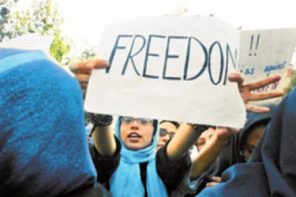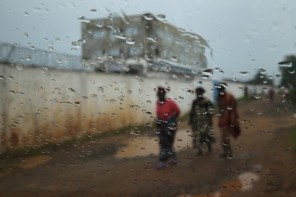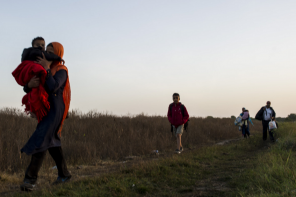Journalism loves anniversaries, and South Sudan’s first anniversary of independence (or, as it’s been dubbed in places, its “birthday”) is a naturally an occassion for a closer look at everything that’s happened in the last year. One thing to watch: Reuters invested in an entire week of South Sudan special coverage, starting with a piece from eastern Sudan, with a really grassroots issue:
In December, the people of this town watched the national army stand by while thousands of young men from a rival ethnic group stormed in for a cattle raid. The interlopers shot and macheted hundreds of people, burned homes and stole tens of thousands of cows.
One month on, the state minister for law enforcement arrived in this part of eastern South Sudan to convince residents that the fledgling nation’s new government was ready to help – and that they should give up their weapons.Gabriel Duop, a man built like a refrigerator, sat behind a wooden desk in a dirt field, a notebook in front of him.
“We are the government,” he told the crowd. “And we want peace.”
But the people wanted answers. Who, they asked, would protect them when the raiders returned?
That the citizens of the world’s newest nation are making such demands is both a sign of progress and an indication of how far South Sudan has to go. Cattle raids are centuries old in the region. The expectation that a central government can and should halt them is much newer.
This really resonated with me. In the places I’ve had a chance to report on post-conflict transitions, I’ve seen this issue worked out in different ways — practices people haven known forever, because those habits protect them, bumping into new notions, and dubious promises, of state authority. And not just in post-conflict transitional states. When I was in a desert in northwestern Kenya — a country we could probably all agree is a functioning state — heard about a cattle-raiding problem from every herder I talked to. And I heard, from everyone, about how far from any intimation of governance they felt. And by “everyone,” I don’t just mean the folks who live beyond roads and schools. I mean my taxi driver from Nairobi, who dropped me at the northernmost point where the tarmac ends (or did then) — another 8 hour bus ride from where I needed to be — and said, with genuine sympathy, “Tell those people that Kenya says hello.”
So I appreciated that Dziadosz’s Reuters piece starts with the challenge all governments, everywhere, face, even when we aren’t paying news-hook-driven attention to them, and that he so deftly points out the obvious: South Sudan ain’t that old. Anniversaries often tempt pundits to judge, and journalists to give them a platform to do it. Even though Dziadosz inevitably raises the specter of future failure, he calls South Sudan’s existence, even one year on, “wildly optimistic” and largely avoids the false choice the anniversary might tempt us toward, a la “Can South Sudan (Ever) Succceed?” (subtext: “Foreigners weary of Africa’s failed states”).
I also appreciated this companion piece, by Reuters’ Juba correspondent, Hez Holland. He focuses on unfulfilled promises from a street level in a lovely panoply of ordinrary — and frustrated — Sudanese voices. Here’s my favorite part:
The challenges have not dampened everyone’s optimism.
Leaning back on a plastic garden chair in an unfinished building near Juba airport, student Pater Achuil sipped a glass of milk and listed the ways life had improved since secession.
“We have waited for the flower of freedom,” he said, shards of concrete poking through the capital’s skyline behind him. “The difference you can feel here in South Sudan is that … even the government cannot hassle you (now).”
But moments later, police in blue camouflage brandishing Kalashnikov rifles raided the tea stall, confiscated the shisha water pipes and loaded the chairs onto a truck.
Achuil stood with his friend to the side, baffled. The officer brushed off a question about whether the raid was part of a drive to clean up Juba ahead of celebrations.
“This is not your concern,” he said.
A few other things you might want to check out:
- Howard French contrasts the rosy view of Western donors and aid workers, “whose agencies, careers, and sometimes personal feelings are deeply invested in the birth and success of this new nation[,]” with Southern Sudanese intellectuals, independent journalists and civil society activists, who describe a familiar catalog of entitlement behaviors by rebels-turned-governments.
- James Copnall, BBC’s correspondent in Khartoum, heads to Juba for the anniversary. Peter Biar Ajak, who heads a Juba think tank, tells him the country (and presumably the rest of us journalists?) shouldn’t be too distracted by tht $4 billion. “[I]n our history, look how much the northerners looted, the British, the Turks,” he told Copnall, writing in The Guardian. “Maybe these guys stole $4bn but they brought a nation. We need to look a bit longer term, we need a generational change. We need the liberation generation to give way to a developmental generation.”
- Tom Murphy usefully organizes a Twitter debate about the framing of South Sudan’s independence. Semhar Araia, founder and executive director of the Diaspora African Women’s Network, objected to the title of the ONE campaign’s blog post for the occasion: “South Sudan: A one-year unhappy anniversary.” Here’s her Tweet that really gets to the point “Unhappy my ass. #Africa is free with or without you. Thank you very much.” There’s a caution-intoning cameo by Vanessa Parra; ONE changes its headline; Semhar sends thanks. But I would recommend you read the whole thing for the ending: a thoughtful reflection by TMS Ruge, Project Diaspora co-founder, on reflexive criticism of Africa narratives.
- “Meanwhile, in the other Sudan…” The end of June brought protestors to the streets of Khartoum. I’m not sure the media ignored the story to the extent that has been argued, but no doubt something’s simmering, and Bashir’s government is cracking down. Foreign Policy had this great piece from Amir Ahmad Nasr, a Sudanese writer and digital activist, with background on what’s going on and a call for international support. And with this notable bit of caution for narrative-makers:
“It is important to understand why Sudanese would risk their lives to oppose Bashir. The narratives peddled by some commentators about the country’s recent conflicts — that they are between “Arabs versus Africans,” or “Muslims versus Christians” — are not only unhelpful, they are wrong. These characterizations have neither benefited the international community nor the diverse citizens of Sudan — including the Arabs and Afro-Arabs of the North who felt alienated by it, and who have also been violently oppressed for decades.”
UPDATE: One more, which I somehow missed: Alan Boswell’s critical look at the SPLM in Foreign Policy, and Trevor Snapp’s Nuba Mountains photos.
Those are some quick hits on my list. What are you reading?





Hi Jina,
I love your blog but do be careful to refer to the area and people you’re discussing as South Sudanese. It’s more than just a political distinction- for example, “eastern Sudan” actually has its own massively under-reported conflict and it’s quite confusing to hear Jonglei called “eastern Sudan” and the Beja would probably also find this confusing.
A second challenge I would like to make to this statement. “South Sudan ain’t that old. Anniversaries often tempt pundits to judge, and journalists to give them a platform to do it.” An even cursory review of the journalist coverage of South Sudan during the CPA period should raise serious red flags about the journalistic integrity or motives of most of the cadre reporting on South Sudan. Whether it was political sympathies with the SPLA/M’s political and military program, fears of being kicked out, or not believing a series of horrifying and deeply worrying actions by the SPLM/A were worthy of international news coverage, the truth of the matter is that until the Government of South Sudan invaded Heglig in April of this year they largely got a free pass from the international media who were as complicit as the UN, donors, NGOs, and regimes in Juba and Khartoum in failing to address the very deep issues in South Sudan in anything other than a one-off or superficial way between 2005 and April 2012. So perhaps journalists shouldn’t use anniversaries as a platform for speaking the truth but it’s about damn time they started speaking the truth in South Sudan.
Thanks, anonymous, and sorry the comment got stuck while I was away. Both are good points. But even for those who share your view that the SPLM/A “got a free pass” from the international media, I’m not sure it’s much solace that the winds have blown another way. They’ll shift course again, as always. (To leave aside that generally speaking, there are also usually at least a few good journalists, even in so dismal a narrative climate.)
Nice post which This really resonated with me. In the places I’ve had a chance to report on post-conflict transitions, I’ve seen this issue worked out in different ways practices people haven known forever, because those habits protect them, bumping into new notions, and dubious promises, of state authority. And not just in post-conflict transitional states. Thanks a lot for posting.